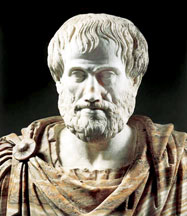|
Aristotle :
The man of real art
by Dr. R. Premkumar
It is believed that many aesthetic thoughts of Greek philosopher
Aristotle were expressed in his magnum opus, Poetics and its tremendous
influence of artistic world is extended for more than 600 years.
Literary critics opine that his entire aesthetic ideas were contrary to
those of Plato, his master under whom he studied nearly 20 years.
 Aristotle compares art with what is not art. Ethics and aesthetics
are fundamentally different from one another. Aristotle considers that
ethics deals with action and aesthetics with creative works. Aristotle compares art with what is not art. Ethics and aesthetics
are fundamentally different from one another. Aristotle considers that
ethics deals with action and aesthetics with creative works.
Many species reproduce their offspring like them; a plant makes its
offspring like it, a human being produces his child like him, but an
artist creates works of art different from him.
Aristotle divides art into two categories. The first category
consists of art which completes the work of nature. Medicine comes under
this category and in the condition of disease this art functions by
curing the disease.
The second type of art consists of usual forms created by imitating
objects and events with the help of imagination. This is generally known
as mimesis. Aristotle discusses it in his Poetics. For Plato, art is a
copy of the copy, but for Aristotle it is a copy of reality which exists
in particular objects or events.
Art reveals a general truth about objects or events. For Aristotle,
art is an activity of finding ideas or forms in individual objects or
events and those ideas or forms are eternal in nature. Aristotle argues
that an artiste releases a general truth imprisoned in the individual
objects or events.
History
Comparing history and art, Aristotle shows that art is better than
history because history deals with things pertaining to states of the
ephemeral and impermanent, but art with the everlasting and the eternal.
Aristotle compared philosophy with perfect general concepts and art
is a combination of particular things and general truths.
Aristotle disagreed with Empedocles, a philosopher, for his
philosophical ideas in the form of art, i.e., in poetic verses and
insists that art should only play its role and not the role of
philosophy.
Aristotle agrees with Plato on the point that art is not better than
philosophy and he also recognises that philosophy is the highest truth
that consists of art.
For Aristotle art is a stepping stone for the realisation of the
truth and not an obstacle for the same. Plato neglects the role of art
in the development of individuals and society, but Aristotle recognises
the significant role of art at the above levels. Aristotle realises the
invaluable contribution of art towards the perfection of human beings.
Forms of art
Among the forms of art, Aristotle pays more attention to drama. The
story of a drama may be based on history or myth, but its plot should
have a message or purpose which reveals a general truth. Aristotle
classifies drama into tragedy and comedy and opines that feelings of
fear and sympathy raised by the forms of the drama purify the souls of
the spectators. Aristotle believes that the works of tragedy is a
necessary instrument for mental health of human being and he seems to
have realised the psychological benefits of the works of tragedy, i.e.,
catharsis (the process by which unwanted feelings and sufferings are
removed and a balanced mind is maintained). Aristotle believes that a
work of tragedy has the capacity to bring out equanimity in the minds of
spectators or readers and it functions like a psychological treatment.
Emotions have been imprisoned in the thoughts of Socrates and Plato,
but emotions enjoy some freedom in the doctrine of Aristotle and he
tries to make reason and emotion into best friends. Aristotle asserts
that the highest artistic experience leads one to a perfect ethical life
and happiness and maintains that forms of art and experience of the same
help one to express one's feelings in a disciplined manner.
Solace
For Aristotle, to experience the forms of art makes value and meaning
of one's life and it brings solace and peace to the soul and he contends
that an imitative work of art which has some knowledge on particular
objects or events consist of labour, talent and a purpose of the artist.
A work of art is not a simple copy of a particular object or event.
Critics opine that Aristotle has not given a clear cut definition for
the concept of beauty. In his work Rhetoric, he tries to explain the
concept. Scholars consider that the concept of beauty receives a
relative rather than an absolute meaning in the Aristotelian
interpretation. For Aristotle, a work of art is not an illusion, but it
is real, leading to the realisation of the truth. |

